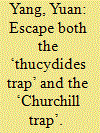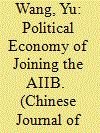|
|
|
Sort Order |
|
|
|
Items / Page
|
|
|
|
|
|
|
| Srl | Item |
| 1 |
ID:
160243


|
|
|
|
|
| Summary/Abstract |
The security dilemma describes the tragic spiral ensuing from states’ attempts to enhance their security under anarchy. Even in a world consisting solely of status quo-oriented states, the outcome of the dilemma is, in theory, increased conflict and reduced security for all. After the Cold War ended many voices claimed that the security dilemma was mainly a thing of the past. Others, however, disagreed, arguing that security competition and interstate conflict would still be prominent features of the international system. We provide relevant empirical tests of such stances which attempt to reveal whether action–reaction dynamics have been prevalent in the post-Cold War period, with data covering 150 countries and spanning the period 1988–2014. Our dependent variable uses data on the changes in states’ military spending; our main independent variable codes the weighted average of arms spending changes among neighbouring states. Thereby we get a novel measure of whether states in general structure their military budgets according to the alterations in neighbouring countries’ military capacity. Our results indicate that this is indeed the case; the security dilemma, and action–reaction forms of behaviour more broadly (including both ‘vicious’ and ‘virtuous’ cycles), are still key mechanisms in the international system. This relationship holds for the entire post-Cold War period, though results for the last five to six years are particularly strong.
|
|
|
|
|
|
|
|
|
|
|
|
|
|
|
|
| 2 |
ID:
160244


|
|
|
|
|
| Summary/Abstract |
The ‘Thucydides trap’ exaggerates the risk of war breaking out between the rising power and the ruling power in the contemporary age. The greater challenge facing China and the United States is to avoid falling into the ‘Churchill trap’. That is, falling into a long-term confrontation by repeating the mistakes of the Cold War between the US and the USSR. Both the ‘old’ history of the ancient East Asian bipolar system and the current experience of Sino-US interaction in East Asia suggest that, in addition to hegemonic war and cold war, there is a third type of great power relationship between the two poles, which I call ‘co-ruling’, whereby rather than being geographically demarcated according to their respective ‘spheres of influence’, the two superpowers jointly lead all or most of the small and medium-sized countries in the system. The theoretical and case studies examined in the article imply that the ‘co-ruling’ mode will appear and be sustained at a time when the two superpowers’ foreign functions are differentiated (i.e. each of the two poles can only meet one of the indispensable needs of small countries, and the two needs that the two poles can respectively meet are different ones), when inter-great-power war is no longer a viable strategic option. The antagonistic and geopolitical colours of the Cold War ‘divided-ruling’ mode of power politics will be less strident in the ‘co-ruling’ mode, so offering an illuminating escape from both the ‘Thucydides trap’ and the ‘Churchill trap’.
|
|
|
|
|
|
|
|
|
|
|
|
|
|
|
|
| 3 |
ID:
160241


|
|
|
|
|
| Summary/Abstract |
The Sino-Pakistani relationship illustrates a truly relational identity. It involves two relational selves constituting each other, and the formation of the China-Pakistan Economic Corridor (CPEC) independently constituting each of them. Both the study and the presentation of this relational identity are only possible under an epistemology of relationality, as opposed to the epistemology of the self-interested actor. The article enlists the anthropological notion of post-Chineseness, which typologises relationality in accordance with how Pakistan and China identify each other in their strategic choice of relationship. It finds that China has moved from its expectations of Pakistan as being an owner of physical Chineseness, through hybrid Chineseness, and ultimately progressing to moral Chineseness under the CPEC. By contrast, Pakistan’s self-positioning vis-à-vis China has shifted from the ownership of physical Chineseness, via experiential Chineseness, to moral Chineseness. Among them, experiential Chineseness is the most relevant element in explaining the changing bilateral relationships under the epistemology of relationality. It is the spontaneous rise of intimacy, or friendship, made possible by the long-term process of a collegial working relationship.
|
|
|
|
|
|
|
|
|
|
|
|
|
|
|
|
| 4 |
ID:
160240


|
|
|
|
|
| Summary/Abstract |
This article analyzes the determinants of new prospective members of the Asian Infrastructure Investment Bank (AIIB). I argue that less democratic countries are more likely to apply, and that when deciding to join the institution countries learn from their neighbors and from any previous international organization (IO) interactions they have had with China. Building on detailed panel data covering the institution’s founding period, i.e. from October 24, 2014 to March 31, 2015, I fit both a probit model with time polynomials and a Cox duration model to identify country characteristics that correlate with joining the AIIB. I show that countries with lower polity scores or whose neighbors had already become members were more likely to join, and that the probability was higher for countries that belonged to China-led IOs. Lastly, I show that countries under-represented in the existing international financial system were also more likely to join. My findings highlight the importance of democracy in shaping the membership structure of the AIIB, and demonstrate how countries leverage information from their neighbors and from previous interactions with China to adjust the perceived risk of joining. They also provide the first modern-day empirical support for the contested multilateralism framework.
|
|
|
|
|
|
|
|
|
|
|
|
|
|
|
|
|
|
|
|
|